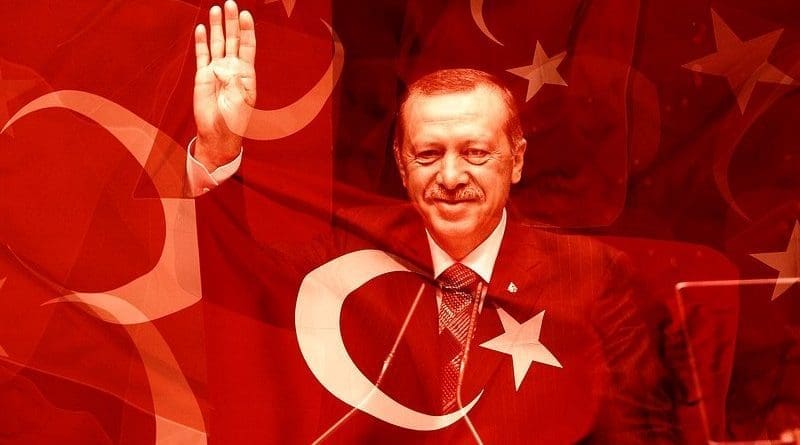Khashoggi Murder Leads To Fundamental Regional Alignment: Public Enemy Number 1 Is Now Turkey – OpEd
It may be an exaggeration to say that the murder of one man can change the trajectory of relationships among multiple nations in the Middle East. But the assassination of Jamal Khashoggi by Saudi Arabia’s Crown Prince Mohammed bin Salman, appears to have done precisely that. David Hearst’s riveting account of secret meetings among Saudi Arabia, the Gulf States, and Israel designed to woo Bashar al Assad back into the Arab fold; and machinations designed to box out Turkey and elevate it to Public Enemy Number 1, was published this week in Middle East Eye.
As he wrote:
The diplomatic initiative was agreed at a secret meeting held in a Gulf capital last month which was attended by senior intelligence officials from the four countries including Yossi Cohen, the director of Mossad,
An added element in the calculations of those participating in this meeting was the likelihood that the U.S., under Donald Trump, had exhausted its ability to influence events either in Syria or Turkey in ways that could benefit them. The Saudis in particular hoped that the U.S. would offer fulsome support for their response to the Khashoggi murder so that the world would put the scandal behind it. However, Congressional outrage at both the murder and Trump’s attempt to whitewash it, have defeated that strategy. As a result, MBS has turned to his brothers in arms, the Israelis and his Gulf cousins to ride out the storm.
But their deliberations reveal they haven’t entirely given up on the U.S. In order to encourage its continued engagement on behalf of Saudi Arabia, the assembled group proposed to ease the planned U.S. troop withdrawal from Afghanistan by brokering talks with the Taliban aimed at stabilizing that country in preparation for the troop drawdown. Further, on the same day Secretary of State Pompeo visited Riyadh, the Saudis made a $100-million “payment.” The report doesn’t indicate the nature or purpose of the payment. But given a president who has dollar-signs for eyeballs, such blandishments would not go unnoticed or appreciated.
There is a new Syrian wrinkle: instead of fighting Assad and his allies, those convening have decided to take a different tack. Since Assad has essentially won the war against Sunni Islamists foes long-supported by Saudi Arabia and its allies, the new approach might be characterized as: if you can’t beat ’em, join ’em.
Invite Assad to rejoin the Arab League and restore diplomatic relations with member states broken off at the beginning of the civil war. Offer billions of aid to rebuild Syria. And offer support to Assad in his efforts to regain control of northern regions of his country now controlled by Turkish forces and their allies.
Under the old saying: the enemy of my enemy is my friend, the group determined to throw its weight behind Syrian and Turkish Kurds fighting against Turkey, which itself has endured a long struggle to tame a Kurdish insurgency inside its borders.
The Sunni axis desperately wants to persuade Assad to either renounce of reduce his reliance on his Iranian allies. But the language used is itself patronizing and belittled the Syrian leader as much as it cajoled him to comply:
“They did not expect Bashar to break relations with Iran, but they wanted Bashar to use the Iranians rather than be used by them,” a Gulf official briefed on the discussions said.
“The message was: ‘Return back to how your father treated the Iranians, at least as an equal at the table, rather than subservient to Iranian interests.’”
Perhaps the most important aspect of this meeting was the realization among those attending that Iran, which had been the foremost enemy for many of them (especially the Saudis and Israel) was fading in that role. In light of the Khashoggi killing and Turkey’s rise as a formidable military power in the region, playing major roles both in Syria and Iraq, Erdogan had risen to the top of the heap of villains confronting the Sunni alliance.
This suits the Israelis perfectly since Erdogan has been a thorn in their side for a decade or more. Every statement he makes about Palestine or Gaza incites greater animosity towards him as he compares Israel to the Nazis in its treatment of the Palestinians. Israel has also arrested a number of Turkish nationals, including academics, who are making pilgrimages to the Jerusalem holy sites. While some have been deported, a number have been imprisoned for long periods.
What’s noticeable about this shift is that Israel has long held Iran as its most dangerous foe in the region. Bibi Netanyahu, according to numerous accounts, was once hours away from ordering a massive air strike on Iranian nuclear sites, only to be called off the plan by his military and intelligence chiefs. Iran is the Israeli’s bete noire. His punching bad which he can always rely on to rally his voters when politics call for it.
Perhaps with Assad’s victory, Bibi believes Iran can no longer be relied on to stir up mass fear and anxiety. So a new bogeyman is needed. Erdogan, whose dictatorial proclivities make him an easy caricature, as the ayatollahs once were, is an easy target. He bellows, he hectors, he shouts down his enemies. He’s a megalomaniac with a caliph-complex. Almost a cartoon figure. After milking Iran as Israel’s existential enemy for so long that it has exhausted its usefulness, Bibi now seeks a suitable replacement. Turkey’s authoritarian leader more than fits the bill.
This article was published at Tikun Olam

